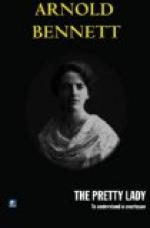told her that the German staff had ordered seventy-five
rooms at the Hotel des Postes at Ghent. Seventy-five
rooms. And that in the space of a few hours Ghent
had become a city of the dead.... Thousands of
refugees in Ostend. Thousands of escaped virgins.
Thousands of wounded soldiers. Often, the sound
of guns all day and all night. And in the daytime
occasionally, a sharp sound, very loud; that meant
that a German aeroplane was over the town—killing
... Plenty to kill. Ostend was always full,
behind the Digue, and yet people were always leaving—by
steamer. Steamers taken by assault. At first
there had been formalities, permits, passports.
But when one steamer had been taken by assault—no
more formalities! In trying to board the steamers
people were drowned. They fell into the water
and nobody troubled—so said the old woman.
Christine was better; desired to rise. The
rouquin
said No, not yet. He would believe naught.
And now he believed one thing, and it filled his mind—that
German submarines sank all refugee ships in the North
Sea. Proof of the folly of leaving Ostend.
Yet immediately afterwards he came and told her to
get up. That is to say, she had been up for several
days, but not outside. He told her to come away,
come away. She had only summer clothes, and it
was mid-October. What a climate, Ostend in October!
The old woman said that thousands of parcels of clothes
for refugees had been sent by generous England.
She got a parcel; she had means of getting it.
She opened it with pride in the bedroom of the flat.
It contained eight corsets and a ball-dress.
A droll race, all the same, the English. Had
they no imagination? But, no doubt, society women
were the same everywhere. It was notorious that
in France....
Christine went forth in her summer clothes. The
rouquin had got an old horse-carriage.
He gave her much American money—or, rather,
cheques—which, true enough, she had since
cashed with no difficulty in London. They had
to leave the carriage. The station square was
full of guns and women and children and bundles.
Yes, together with a few men. She spent the whole
night in the station square with the rouquin,
in her summer clothes and his overcoat. At six
o’clock in the evening it was already dark.
A night interminable. Babies crying. One
heard that at the other end of the square a baby had
been born. She, Christine, sat next to a young
mother with a baby. Both mother and baby had
the right arm bandaged. They had both been shot
through the arm with the same bullet. It was
near Aerschot. The young woman also told her....
No, she could not relate that to an Englishman.
Happily it did not rain. But the wind and the
cold! In the morning the rouquin put her
on to a fishing-vessel. She had nothing but her
bonds of the City of Paris and her American cheques.
The crush was frightful. The captain of the fishing-vessel,
however, comprehended what discipline was. He




